| Srl | Item |
| 1 |
ID:
132468
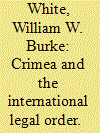

|
|
|
|
|
| Publication |
2014.
|
| Summary/Abstract |
Putin's exploitation of the tension between the principles of non-intervention and self-determination is in the tradition of great-power interaction with international law. But Russia's interpretation sets dangerous precedents.
Crimea is Russia's. The March 2014 referendum and Russia's subsequent annexation of Crimea are now events of history, even while the territorial borders and political future of the rest of Ukraine remain contested. Yet, as international attention has moved from Sevastopol to Kiev and more recent crises elsewhere, a key balance between two of the most fundamental principles of the post-Second World War international legal and political order remains at stake.
|
|
|
|
|
|
|
|
|
|
|
|
|
|
|
|
| 2 |
ID:
127329
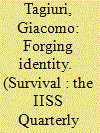

|
|
|
|
|
| Publication |
2014.
|
| Summary/Abstract |
A more prominent and direct European role in the protection of cultural heritage and promotion of the arts could revitalise an exhausted integration process.
|
|
|
|
|
|
|
|
|
|
|
|
|
|
|
|
| 3 |
ID:
127318
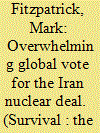

|
|
|
|
|
| Publication |
2014.
|
| Summary/Abstract |
One thing that is clear about the interim nuclear deal with Iran, reached on 24 November in Geneva, is that much of the world supports it. Nearly 70 nations have expressed that support formally. Nations liked that it capped Iran's programme, averted prospects for war, and showed light at the end of the sanctions tunnel. When members of the US Congress talk about legislating what a final deal with Iran must achieve, they ought to consider that the other parties to the negotiation also have a vote.
|
|
|
|
|
|
|
|
|
|
|
|
|
|
|
|
| 4 |
ID:
130863
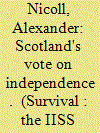

|
|
|
|
|
| Publication |
2014.
|
| Summary/Abstract |
A 'yes' vote, though unlikely, would fundamentally alter the British Isles, and potentially Europe as well. A routine parliamentary afternoon in the United Kingdom: under debate are final amendments to a bill designed to improve advice given to people in debt and to adjust the terms for those who fall into bankruptcy. A government minister, Fergus Ewing, speaks enthusiastically of a financial National Health Service. With matching spirit, his Labour Party opponent, Jenny Marra, attacks some measures as too harsh on bankrupt debtors. A division is called on her proposed amendments, and the number of members in the chamber quickly swells to more than 100 for the votes. The government wins them easily. However, in a remarkable display of consensus politics, the opposition parties, both Labour and the Conservatives, then support the bill, and it is duly passed.
|
|
|
|
|
|
|
|
|
|
|
|
|
|
|
|
| 5 |
ID:
127316
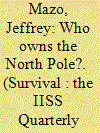

|
|
|
|
|
| Publication |
2014.
|
| Summary/Abstract |
On 9 December 2013 Canadian Minister of Foreign Affairs John Baird announced that Ottawa was deferring its expected submission to an obscure UN commission with regard to mineral rights on and below parts of the Arctic Ocean seabed to ensure that the eventual submission 'includes Canada's claim to the North Pole'. According to Canadian media reports, the claim that had been prepared for submission by scientists and civil servants did not include the pole, and was therefore vetoed by Prime Minister Stephen Harper. The following day, Russian President Vladimir Putin told his defence ministry, in televised remarks, to 'devote special attention to deploying infrastructure and military units in the Arctic' - a statement widely interpreted as a direct response to the Canadian action.
|
|
|
|
|
|
|
|
|
|
|
|
|
|
|
|